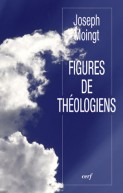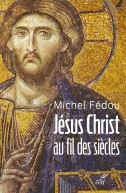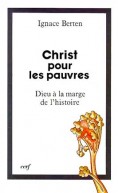Dieu qui vient à l'homme, II-1 - CF 245
Collection Cogitatio Fidei - N° 245
480 pages - oct. 2005
46,20€
Après avoir scruté, dans un tome précédent, sous quelle identité Dieu se dévoile en Jésus de Nazareth à des hommes qui portaient le deuil de sa mort, nous envisageons de suivre, dans ce nouveau volume, l'itinéraire du Verbe de Dieu traversant, depuis le commencement des temps, l'opacité silencieuse de la « chair du monde » (l'expression est prise à Merleau-Ponty) jusqu'à devenir chair lui-même en Jésus. Cette traversée nous fera rencontrer les grands dogmes de la foi chrétienne : trinité et incarnation, création, péché originel et révélation de Dieu dans l'histoire. Notre objectif ne sera pas de les exposer dans le cadre des traités classiques de théologie, mais de rendre pensable, à des esprits qui ont suivi la formidable évolution des rationalités des temps modernes, ce qui a été pensé dans les tout premiers siècles de notre ère. La difficulté ne sera pas moindre de concilier la lecture actuelle des Écritures, qui se plie obligatoirement aux nouvelles requêtes de l'étude historique et critique des textes, avec celle des Pères de l'Église, dont les visées et les méthodes étaient bien différentes. Il s'agira, notamment, de traduire l'apparition de Dieu dans le temps en termes d'être et d'éternité, de confronter le langage biblique de la création à celui des sciences de l'univers, ou le discours du péché au problème du mal étudié par les philosophes, et plus encore, au terme du parcours, de parler de l'humanisation du Verbe, que les anciens concevaient du point de vue métaphysique de l'union de l'âme an corps, dans les catégories actuelles de l'anthropologie, celles de l'être-au-monde et au temps et de la libre subjectivité. C'est donc une recherche qui fait appel au courage de la foi pour se penser et se dire, en fidélité retrouvée à son origine, dans la nouveauté où se cherchent les hommes de ce temps. Il restera à observer comment cette révélation se transmet aujourd'hui à travers l'Église, malgré les ombres de son passé et les incertitudes de son avenir : ce sera l'objet d'un troisième volume, à paraître en 2006.
--
In a previous tome, we studied the identity God as revealed in Jesus of Nazareth, to men who were the bearers of his death. In this volume we follow the path of the Word of God as it has been travelling since the beginning of time through the silent opacity of what Merleau-Ponty called the “flesh of the world”. That journey is the ideal opportunity to recount the great dogmas of Christian faith: the Trinity and incarnation, creation, original sin and the Revelation of God in history. Our aim is not to “expose” as in classic treatises of theology, but to make those things that were thought in the first centuries of our era “think-able” to minds that have been subjected to the formidable evolution of reason in modern times. Equally challenging the conciliation of today’s reading of the Scriptures, which necessarily bends to the demands of historical and critical examination of the texts, with that of the Fathers of the Church, men whose aims and methods were very different. Our aim is to translate the apparition of God in time, in terms of being and eternity, to confront the Bible’s account of the Creation with that of the sciences of the universe - or the theory of sin with the problem of evil as studied by philosophers - and, ultimately, to speak of the humanisation of the Word, which the ancients conceived metaphysically as the union of soul and body, in today’s categories of anthropology, of being-in-the-world and in time, and free subjectivity. It will be interesting to note how this revelation is transmitted today throughout the Church, in spite of the shadowy areas of its past and the incertitude of its future: all of which will form the matter for a third volume to be published in 2006.
--
In a previous tome, we studied the identity God as revealed in Jesus of Nazareth, to men who were the bearers of his death. In this volume we follow the path of the Word of God as it has been travelling since the beginning of time through the silent opacity of what Merleau-Ponty called the “flesh of the world”. That journey is the ideal opportunity to recount the great dogmas of Christian faith: the Trinity and incarnation, creation, original sin and the Revelation of God in history. Our aim is not to “expose” as in classic treatises of theology, but to make those things that were thought in the first centuries of our era “think-able” to minds that have been subjected to the formidable evolution of reason in modern times. Equally challenging the conciliation of today’s reading of the Scriptures, which necessarily bends to the demands of historical and critical examination of the texts, with that of the Fathers of the Church, men whose aims and methods were very different. Our aim is to translate the apparition of God in time, in terms of being and eternity, to confront the Bible’s account of the Creation with that of the sciences of the universe - or the theory of sin with the problem of evil as studied by philosophers - and, ultimately, to speak of the humanisation of the Word, which the ancients conceived metaphysically as the union of soul and body, in today’s categories of anthropology, of being-in-the-world and in time, and free subjectivity. It will be interesting to note how this revelation is transmitted today throughout the Church, in spite of the shadowy areas of its past and the incertitude of its future: all of which will form the matter for a third volume to be published in 2006.
- Dimensions : 135x215x30
- ISBN : 9782204079020
- Poids : 580 grammes











